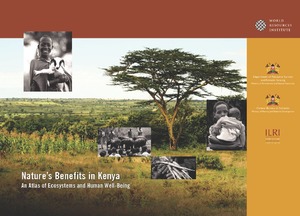Resource information
This report provides a new approach to integrating spatial data on poverty and ecosystems in Kenya. It is endorsed by five permanent secretaries in Kenya and with a foreword by Wangari Maathai (recipient of the 2004 Nobel Peace Prize). It provides a new approach to examining the links between ecosystem services (the benefits derived from nature) and the poor. Through a series of maps and analyses, the authors focus on the environmental resources most Kenyans rely on such as soil, water, forest, rangeland, livestock, and wildlife. The atlas overlays georeferenced statistical information on population and household expenditures with spatial data on ecosystems and their services (water availability, wood supply, wildlife populations, and the like) to yield a picture of how land, people, and prosperity are related in Kenya. While the maps and analyses presented here will not provide easy answers to questions concerning the causes of poverty in Kenya and how ecosystems can best be managed to increase economic growth and improve livelihoods, they are a first step toward stimulating more informed dialogue and provoking questions for which answers may be found. The final section of the atlas provides general findings about the use of the introduced maps for sociogeographic analysis. It concludes with four recommendations that are expected to advance a more comprehensive accounting of ecosystem services and to improve the understanding of poverty-environment relationships in Kenya.



